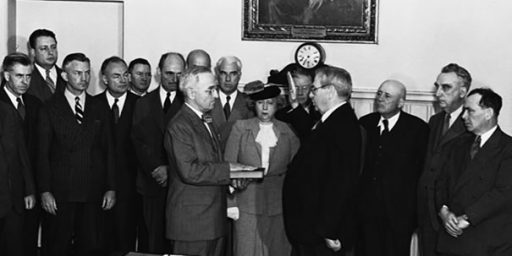Did Democrats Lose Because of Values or Security?
Conventional wisdom tends to separate the two theories: most people either think that values — in the form of morality or social conservatism — propelled George W. Bush’s reelection, or national security — particularly issues stemming from the war on terror — exposed John Kerry’s weaknesses. But my friend Rachel Belton, who co-directs the Truman National Security Project, has a different perspective. She argues that these ideas “need to be unified” and reframed within the context of the Democratic Party:
[I]t is hardly the fault of the Kerry team that Democrats could not win on security. Democrats face a perception problem too deep to be addressed with policies and messaging, or to be overcome in a single campaign. It is a problem of values, of the chasm within the Democratic Party between values and strength, between the Party of Idealists, and the Party of Pragmatists.
The Party of Idealists, embodied by the Howard Dean movement, talks in the ethically-based language of Democratic activists. But scarred by the post-Vietnam aversion to American power, they remain deeply uncomfortable with American national interest, and with the harder tools of foreign policy, particularly the military and intelligence communities. This vocal and visible camp scares Americans, who feel that the Democratic Party does not value their safety.
Moreover, while these individuals see themselves as upholding moral values, their first instinct is often to distrust American action. Thus, they embrace human rights—but think words like democracy and freedom are for neo-cons. They build shantytowns to protest apartheid in South Africa, but are silent when terrorists attack a school in Beslan. Their policies often end up supporting repressive regimes and undermining the values they claim to uphold—leading Americans to see our party as confused and morally rudderless.
Many of our foreign policy experts live in another Democratic Party—the Party of Pragmatists. Perhaps out of fear of being lumped with starry-eyed Wilsonians, they invoke pragmatism when attempting to convey hard-nosed strength. This cohort offers strong, sensible policies, but is deeply uncomfortable grounding these policies in values. Their realpolitik turns off our party’s base, who are led to believe that there is little difference between conservatives and Democrats on foreign policy. Meanwhile, by talking policies and methods, not values and vision, they fail to provide a coherent, overarching message that can inspire the American people.
The more our activists trumpet their moral cause, the more our experts avoid values-based language. Instead of harnessing strength and values together, Democrats see these forces in opposition. No wonder we can̢۪t convince Americans that we have a principled and strong foreign policy!
To regain preeminence in national security, we must reunite security and values within the Democratic worldview. This belief has birthed a movement among a new generation of Democrats. We were not scarred by Vietnam. Instead, we are jointly committed to the values that make us Democrats, and to forging a foreign policy strong enough to stop the deadly, asymmetric, ideological threat of fundamentalist terrorism. In a few months, we have become a force of hundreds through word of mouth alone. We have found many mentors among those who served in previous Democratic administrations, who also see the need for a strong and principled foreign policy. We call ourselves Truman Democrats, because we believe that Truman has much to teach us on the cusp of a new age.
See Oxblog for the rest of the piece. I wholeheartedly agree that there’s room for a Trumanesque agenda. The question now is: Will Democrats listen to the likes of Rachel and reclaim the mantle of their predecessor? Or will they allow Bush to monopolize the strength-and-values platform, as he effectively did during the national convention? This latter path, I suspect, would spell doom for their near-term (and perhaps long-term) electoral prospects.





“Will Democrats listen to the likes of Rachel and reclaim the mantle of their predecessor?”
Well, it’d be sensible of them, so I’m guessing no.
The importance Morals/Values issue in the 2004 election was the result of a badly worded exit poll question. I listened to a commentator on Fox News explain that while all the other options offered in the poll addressed a specific issue, the moral/values option could be answered yes because moral/values means different things to different voter – pro/against abortion, pro/against Iraq war, pro/against gay marriage – all can be answered with a yeas against moral/values.
That the Democratic Party may change its platform based upon the medias over infaltion of the importance of a flawed exit poll qustion is truly disturbing.
The Democrats need to adjust their platform to reflect what the majority of their constituents want – then they will be back on the opath to relevance.